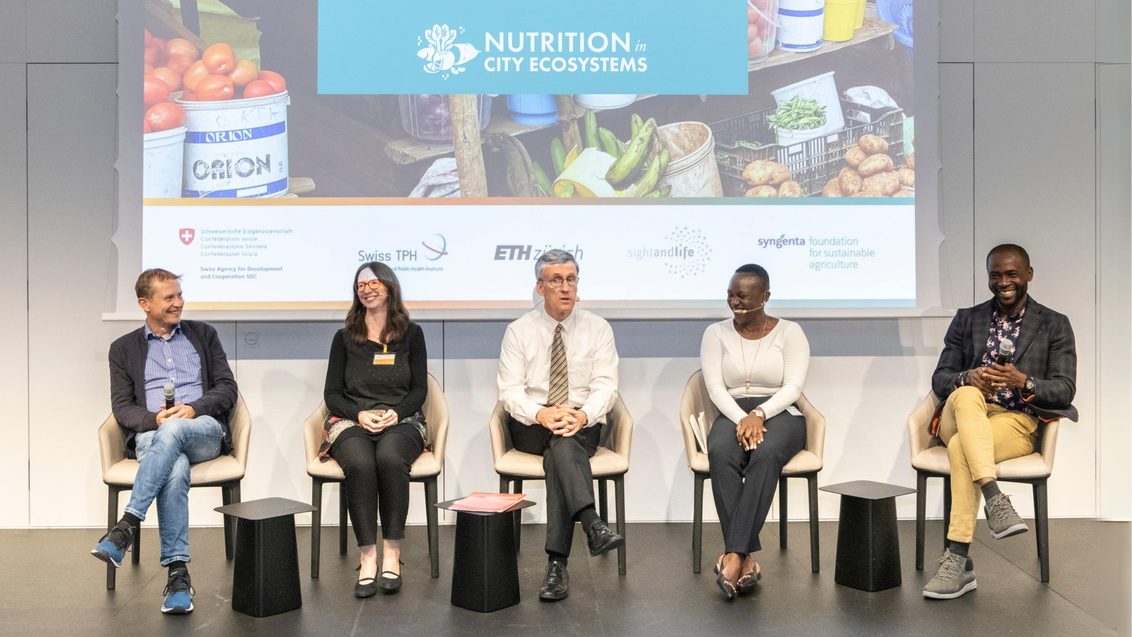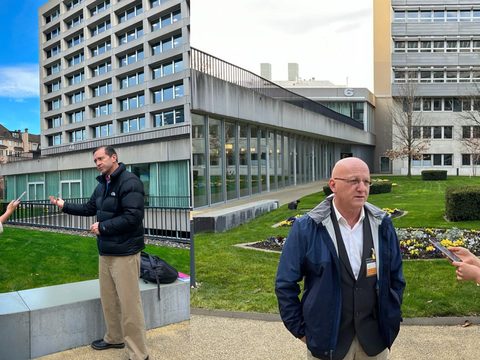We are what we eat – and we all need reminding

African speakers shine a light on the NICE project
Many city inhabitants worldwide eat unhealthily. A recent Learning Forum gave an update on progress with improvements in Kenya and Rwanda. Awareness and agriculture both play a big role.
Malnutrition currently affects one in three people in the world. Two billion people have major difficulties getting sufficient, healthy and nutritious food. A further contributing factor to malnutrition is lack of adequate knowledge on better eating. The NICE project (Nutrition in City Ecosystems) tackles such issues in selected urban settings.
NICE is a Swiss-based partnership§ with secondary cities in Rwanda, Kenya and Bangladesh. Team members recently contributed to Basel University’s Deal with it program by presenting various aspects of the project in Africa. Among other benefits, this NICE Learning Forum gave Basel city authorities and university representatives a chance to gain from African experience.
For our Foundation, hosting the Learning Forum was also an opportunity to recall the place of agriculture in debates about nutrition. As our Kenyan Project Manager Elizabeth Imbo put it: “Whenever we speak about a nutritional project from an agriculture standpoint, people wonder: ‘But what is the link to nutrition?’ Well, that’s where the food comes from!”. Elizabeth had a clear message for Forum participants: “[Agriculture] is where we start talking about food security”.
There are many hurdles on the way to healthy nutrition. As Helen Prytherch* underlined, pre-cooked meals, junk or fast food are often cheaper and easier to eat than healthier alternatives. Unsuitable dietary behavior is a frequent issue in urban environments, as Straton Habumugisha from the Sight and Life Foundation well knows. Straton heads the NICE program in his native Rwanda. "Some people here eat fast food because it's easy. But it's not nutritious. In other cases, people simply don't have enough knowledge to decide to eat nutritious food."
Straton has therefore put a lot of effort into awareness programs, which he presented at the Learning Forum. These activation campaigns target farmers, visitors to health clinics and consumers at markets. “As well as raising awareness, we also aim to present sustainable alternatives and accompany consumers through the necessary changes”, Straton explained. The activities for consumers include market-square theater performances and competitions. Overall, the campaign focuses on the expression Neeza, meaning “all is well”. Its tagline is Turi ibyo turya, “we are what we eat”.
To measure the impact of such campaigns, Straton and his team carried out “Before and After” surveys. The results are clear: people who have been made aware of the benefits of a nutritious diet say their understanding of the topic has improved, and that they are already eating more healthily.
City nutrition benefits from rural entrepreneurship
Moving from awareness to food production, Elizabeth Imbo highlighted the role of Farmers’ Hubs (FH) in Kenya. The Syngenta Foundation’s FH model helps young rural entrepreneurs to build a business serving local smallholders. Their services can include access to advice, seeds, mechanization, insurance and credit. Importantly, FH also collect smallholders’ produce. This enables the farmers to tap into more lucrative markets, including urban consumers.
“The Hubs involved in NICE play a crucial role in providing healthier food to the two western Kenyan cities of Bungoma and Busia”, Elizabeth said. “We are very happy to be creating businesses that are not only sustainable financially but are also changing the lives of people by ensuring that healthy food is available, safe and – we always hope – affordable.”
As Johan Six** highlighted in the concluding panel discussion, NICE also puts considerable emphasis on Good Agriculture Practice and agroecology. “We follow the FAO definition of agroecology” he emphasized. Panel member Charles Nwokoro*** reminded the audience of a further important factor: “As well as good practices in the field, getting safe and healthy food to urban consumers also requires appropriate handling by the people who store, transport and sell it.”
§ The Swiss partners in NICE are Swiss TPH, ETH Zürich, Sight and Life and the Syngenta Foundation. Funding comes from the SDC. In the six project cities, NICE involves the municipal authorities, private companies and many other organizations. The aim is to raise urban populations’ awareness and adoption of healthy, nutritious foods produced using agroecological practices. NICE puts strong emphasis on education and promotion along the food value chain, from farmer to consumer.
*Helen Prytherch coordinates the NICE project internationally. She is Head of Systems Strengthening & Health Promotion Unit at Swiss TPH.
** Johan Six is Professor of Sustainable Agroecosystems at ETH Zürich
*** Charles Nwokoro works for ETH Zürich and the Syngenta Foundation, mainly on the NICE project.

